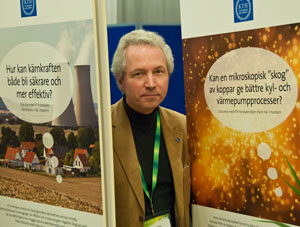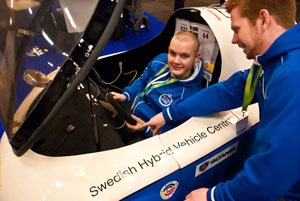KTH at Nordic Energy Outlook
EVENTS
The KTH Energy Platform put the university’s research breadth on display in March at the annual Nordic Energy Outlook conference in Gothenburg. Staged by the Swedish Energy Agency, the conference brought together producers, consumers, regulators and academics for three days of exhibitions and presentations.

“We’re here to strengthen the KTH brand with Sweden’s energy community,” said Professor Ramon Wyss, Director of the Energy Platform. “Our researchers are active in an incredibly diverse range of projects, and this is a great opportunity make new contacts with funders and with companies offering careers for our graduates.”
Professor Wyss said Nordic Energy Outlook (Energiutblick in Swedish) also helps with internal community-building among researchers who may have overlapping interests despite divergent academic paths. “Regardless of which school or program you’re working in, there’s good value in meeting people who are dealing with similar issues. This is what the Energy Platform is all about — bringing people together across disciplines to find solutions that are bigger than the sum of the parts.”

Professor Björn Palm heads the KTH Department of Energy Technology, where some 100 researchers work in four divisions: Heat and Power; Thermodynamics and Refrigeration; Energy and Climate Studies; and Energy Systems Analysis.
“We’re here to meet potential partners, to learn about new products, and to find out what’s happening on the regulatory front,” Palm said. “And we’re here to be seen. KTH is a technical university, but our research isn’t purely technical. We contribute a great deal to policy analysis and political decision-making.”

Examples of this marriage of technical and policy studies can be found in the Division of Energy and Climate Studies, headed by professor Semida Silveira, where research projects include studying strategies for rural electrification and adoption of modern biofuels in developing countries. “You need a combination of economic mechanisms and technologies that can work together and help meet the particular needs of developing areas,” Dr Silveira said. “We look at different models in different countries to see what works and how it can be improved and exported to other places. Almost everything we do is highly interdisciplinary.”
Two undergraduate students, Oscar Sernstad and Gustav Sandborgh, made the trip from Stockholm to Gothenburg to show off the Urban Prototype, a hybrid fuel vehicle they’re helping prepare for the Shell Eco-Marathon competition that challenges students to design and build a car that can travel as far as possible on a given quantity of fuel.
Sandborgh and Sernstad are both undergraduate chemistry students looking to land degree project jobs (known as exjobb in Swedish, the degree project at KTH generally involves 20 weeks of full-time research and analysis on a problem provided by an instructor or an external company).

“We’re in the competition to get insight into how a research project is carried out,” Sandborgh said. “Innovation is the most important thing. We’re not as worried about winning the competition as we are about learning how to do something new. You could work with one design for five years in a row and you’d get a more efficient car, but then you wouldn’t learn as much.”
By Kevin Billinghurst | kb2@kth.se

